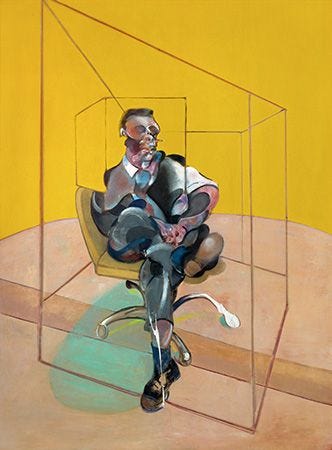I’m always fascinated by how people actually change. Something I said to my therapist in one of our early Zoom sessions was that I was afraid I was a bad person who couldn’t change, and I gestured at all the self-help garbage in my bookshelf behind me. And she said, hm, why would someone who is bad put in so much effort to do better, especially when it doesn’t seem to work?
She was a good therapist because she never positioned herself above me, as someone with the correct answers, diagnoses or solutions. She’d allow me to go my natural way and offer up better processes and tools whenever they were needed. The most meaningful thing I ultimately took away from two years of therapy was: oh, I can change. Oh, I already do change. I just need to actually pay attention to how it’s happening.
You can’t change without introspection, but you can introspect a whole lot without changing. Introspection is a matter of accepting and understanding who you are and where you wish to be. You need both of those pieces to calculate the vector of change accurately. When you have your vector of change from point A to point B, you need to then drive the damn thing.
I like how Henrik Karlsson describes two types of introspection:
He is introspecting, but he’s not introspecting by meditating on his existence or talking to a therapist (though maybe he should); he’s introspecting by acting on the world. He’s introspecting by doing stuff and then observing how it makes him feel—as if he was running a million small experiments trying to figure out the composition of this object that is Nick Cave.
That more conventionally understood ‘meditative’ type of introspection I’ve found to be useful for a big problem where further action creates more problems. When something is so fundamentally wrong that you need to move away from all current approaches. Specifically when I have some kind of thought pattern that parasitically feeds on itself: in computing, a non-terminating loop is the thing you want to avoid at all costs. A common one is: “if I do this work, I’ll will finally be able to accept myself and I can be OK enough to do less work.” Then inevitably, there’s only ever more work to do, and the brainworm that one isn’t doing enough burrows deeper and deeper. I think most people have one of these brainworms inside of them at some point or another.
Another way of framing the balance between meditative and operational introspection is like being able to flip between ‘design’ and ‘test’ phases. You have to balance being correct and gathering momentum. Easier said than done. Someone once said to me, if you wanna say something in a meeting at work and get people to agree with you by contributing fuck-all, just say, ‘well, you know, it’s a balance’, lol.
But introspecting by ‘acting on the world’ is really interesting to me. It’s like operational introspection. When I transitioned out of therapy last year I created a couple of introspective habits. One, I wrote notes in my phone whenever I was waiting and bored and picked up my phone out of habit to look at social media. Two, I tracked my mood and activities several times every day for a year. And they were such stupid, obvious behaviours but the result was a much better relationship with myself, and I didn’t have to interrupt my life to learn more about what was working for me. I’ve noticed this about all relationships, really: they’re really just a string of ordinary, miniscule acts of care. And care comes from close observation; from a diligent desire to understand, and to meet someone where they’re at.
The main principle is that I’ve had be interested in the gap between my behaviours and cognition, and experiment with those changes push and pull against eachother. Sounds complicated, but what I mean is studying what I think, what I want, what I think I want, and what I actually do.
Some people are averse to meditative introspection because it feels navel gazey, sure. But I don’t think it’s bad to be interested in yourself. I think it just becomes problematic when you reflect without acting so long that it only worsens your insecurity about what to do. You can nurture a belief that you can’t trusted to act upon the world unless you understand exactly what you are trying to do and why, which by the way, will never happen. And I think you also nurture a belief that the world is more fragile and vulnerable to your touch than it probably is. Counterintuitively this sort of insecurity can also be quite arrogant.
And people might say in response to that to just trust yourself and be more confident and all but really I don’t think you can or should ‘fake it till you make it’. I think you should trust yourself on things that you have evidence for and be more careful in your approach to things you don’t. Build a body of evidence for who you are, then identify realistic opportunities for change. You aren’t exempt from the constraints of reality because mum said you’re special and capable of anything you put your mind to. But you’ll also see you’re probably not bad and useless, if you pay attention to the right things.
For example, it doesn’t make sense for me to trust myself to pay lots of money for 7am kickboxing classes that are an hour away when I still sometimes cancel my 6am classes that are a 10 minute walk away. So I can’t really make space for kickboxing without changing something else, or getting to a point where I feel confident that I’m the kinda bad bitch who gets up early in the morning to bust my ass without fail. I also wouldn’t trust myself to remedy a relationship where baseline communication is catastrophic. It’s all about what baseline you’re working from. There are times you can push yourself beyond your capacity but they’re very finite. You get maybe a handful of these boosts in a year, depending on how manic and delusional you are.
In contrast, opportunities for arbitrage are almost infinite. You can make your life more inclusive if you’re honest about your capacity and willing to make trade-offs. For example I can trade doing pottery in the evenings for doing exercise in the early mornings, but I can’t do both. Or I can trust myself to navigate difficult problems in a good relationship because I’ve navigated difficult problems in a bad relationship before. And I don’t really have to push myself emotionally and make up confusing stories about who I am to do this, because it becomes fairly matter of fact. “I’ve done it before and I can do it again”: That’s actual confidence.
You can also be creative though. If you’re nervous about writing a novel you can assure yourself with evidence of your competence if you’ve written 500 separate pages about anything before; or more creatively you can feel assured because you’ve both climbed a mountain and started a business before. It depends on how much you think the lateral logic applies. They’re different arguments about how competence is demonstrated; the first grounded in concrete merit and the other is one about psychological capacity.
Beyond unpacking my childhood, my therapist helped me to understand how to both accept my desires and the reality of the situation at the same time; how to braid my dreams with reality. Often when we’re struggling with lasting change, we’re stuck too much in one of these worlds.
So changing is not about deciding to be new and just willing yourself into rebirth. In my experience willpower is pretty elastic, such that when we push ourselves we get snapped back with equal force. Changing is more about negotiating with reality: knowing what’s most important to you, what constraints you’re working with, predicting a response. And knowing if you don’t get what you want now, you can figure out another arrangement.
Enjoy the act of change,
Marlene
Last week’s post - a deeper, critical, philosophical read:
Holy buildings of our own construction
1. I’m a pattern-oriented person. Recursion, self-similarity, and harmonics are interesting to me. Recursive fractals are the convergence of efficiency and beauty; the meeting of perfect process and perfect outcome. This pursuit of recursion draws me to solo journeys. I love to walk alone, stare at something for a v…





